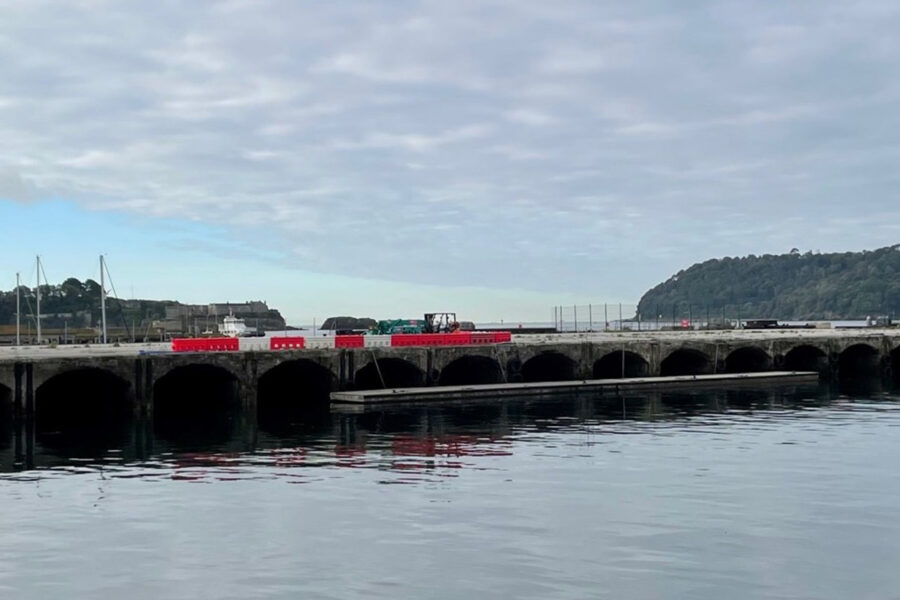Frustrations are mounting in both the catching and processing sectors in Lymouth as the long-planned work on the lock gates at the entrance to Sutton Harbour continues, with no sign of the promised mitigations and compensation that were agreed in principle between harbour users, the Environment Agency (EA) and Sutton Harbour many months ago.
One skipper, who wanted to remain anonymous, told FN that the closures of the lock gates were hitting the bottom lines of multiple harbour users, with the larger vessels working shorter two- or three-day trips, ‘regularly losing the last tow of the trip in order to get in through the gates in time’.
“This may not seem like much to the owners of the harbour, but it is hitting the pay packets of each and every crewman, at a time when they are already feeling the squeeze,” he said.
The skipper of one of the smaller vessels, using the floating pontoons on Trinity Pier, told FN that whilst access to the pier was available, and a workable solution had been found for the provision of boxes, boats were losing money and also seeing huge disruption to their working days.
“We’re having to cut short a couple of fleets early, which for a static-gear boat is basically the profit for the day, with the earlier fleets just paying expenses. On top of that, there are times when after a full day, we’re having to come down to the harbour late at night to move the boat, just to be able to take on ice or bait.
“We were given loads of promises before this all happened, but none of the promises have been honoured. And the four-day complete closure is going to see shore-based staff lose wages as well as working crew, at a time when we are rapidly losing daylight hours, and losing days to weather as well.”
All sides agree about the necessity of the work being done, and accept that there will be inevitable disruption to some fishing activity. However, Edward Baker, CEO of the Plymouth Fishing and Seafood Association (PFSA), which represents some of the impacted vessels and shoreside businesses, told FN that the costs and displacement of activities as a result of the lock gates work was greater than it needed to be, and that promises of compensation had not been honoured.
“The PFSA has started to build a good relationship with the Sutton Harbour staff, and realises that it is issues out of their control that are preventing the supply of ice and bait to vessels at Trinity Pier,” he said.
“We recognise and understand that Sutton Harbour don’t want to antagonise residents who overlook the pier, but the lack of access to use the crane, which can only be operated by Sutton Harbour staff, is having a real impact on vessels’ ability to take on ice and bait or discharge catches. We were told that the covenant on the pier that restricted commercial use would be lifted, but this hasn’t been actioned.
“This is really hurting some shoreside businesses, as well as having forced some boats to relocate to Brixham and Looe, adding to their costs. We’ve agreed that the full four-day closure planned for essential work needs careful extra planning, but we can’t get Sutton Harbour, the EA and Plymouth Council to agree a time to discuss this.
“PFSA are directing their plea for support to the EA and Sutton Harbour Company and realise that the fishing industry has good relationships with the Sutton Harbour staff generally.”
No progress on compensation
The issue of compensation for the disruption – initially promised, fishermen say, in meetings held many months before the work started – has seen no progress at all. The delays may in part be due to ongoing internal discussions between the various parties about who will pay this, although the legal basis appears to be fairly clear-cut.
Maritime lawyer Andrew Oliver of Andrew Jackson Solicitors in Hull told FN: “If the Environment Agency (EA) is conducting these flood defence works under powers granted to it in the Water Resources Act 1991, in particular Section 165, it is clear that those businesses who have sustained losses incurred as a result of the works are due compensation.
“The act provides for cases to be heard in the Lands Tribunal, but the vessels and businesses affected are mostly owner/operators, micros and small businesses, so I would hope that the EA takes the question of compensation seriously and provides appropriate mechanisms rather than forcing them into court to get what they are due.”
Local MP Luke Pollard said: “Work on the lock gates is essential and needs to happen, but what is also essential is that the fishing industry has safe and decent alternative facilities provided in a timely fashion. That hasn’t happened, and it is adversely affecting not only fishers but shoreside businesses too.
“The Environment Agency must deliver the proper alternative landing site that was promised. The longer the EA and its sub-contractor, Sutton Harbour Holdings, continue to mess up, the bigger the economic consequences and the greater the compensation to local businesses will need to be. That’s why I’ve called for ministers to intervene and get a grip of a project that is so clearly in deep trouble.”
FN contacted both the EA and Sutton Harbour on 16 October with a series of questions and request for comment. As ever, the request to Sutton Harbour was unanswered. The EA did respond, promising a response to specific questions, as well as a joint statement about compensation that was ‘being developed with Sutton Harbour’.
However, as FN went to press, no substantive response had been received from either the EA or Sutton Harbour – a situation, Plymouth fishermen say, that is all too familiar to them.
This story was taken from the latest issue of Fishing News. For more up-to-date and in-depth reports on the UK and Irish commercial fishing sector, subscribe to Fishing News here or buy the latest single issue for just £3.30 here.
Sign up to Fishing News’ FREE e-newsletter here.








